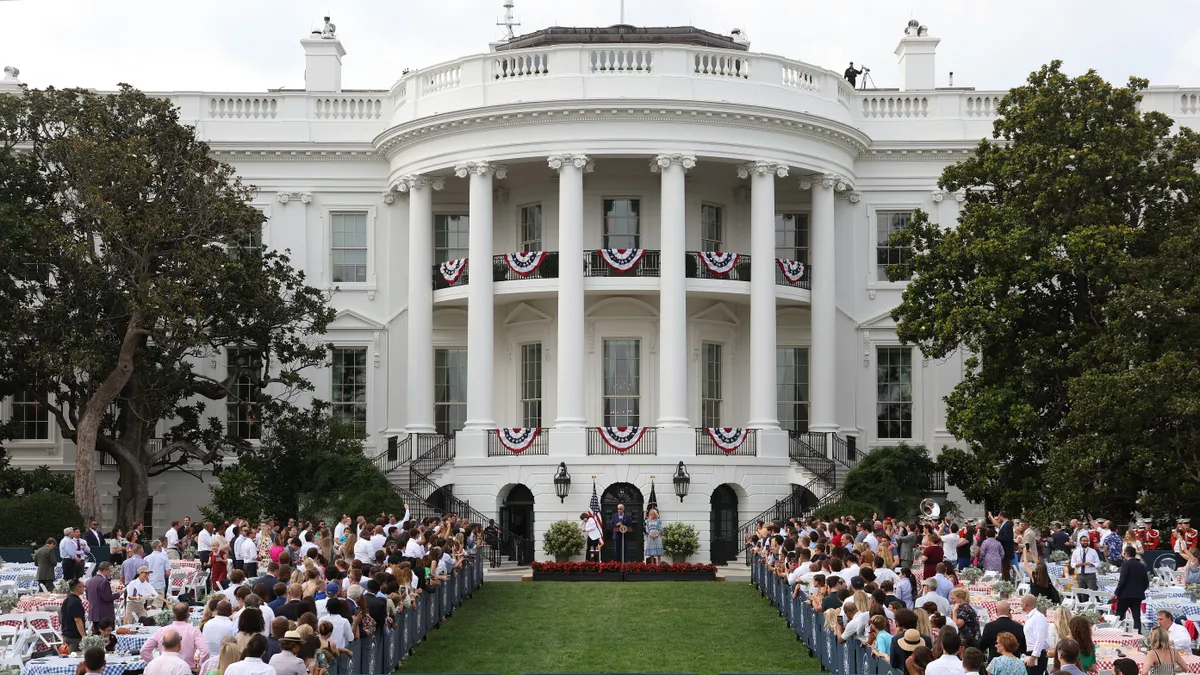Dive Brief:
- Roughly one out of three CFOs have postponed, trimmed or canceled investment plans because of difficulty gauging the impact from the Nov. 5 election on regulation, taxation and other policy, the Federal Reserve Banks of Richmond and Atlanta said Wednesday, citing a quarterly survey.
- Although their optimism in the economy flagged compared with the second quarter survey, CFOs see inflation cooling and forecast growth in revenue and employment during Q3, the two regional Fed banks said, referring to a survey conducted with Duke University’s Fuqua School of Business.
- “In spite of uncertainty in the economy, firms still expect a soft landing,” Sonya Ravindranath Waddell, a Richmond Fed economist, said in a statement. “Expectations for price growth continue to come down into more normal territory.”
Dive Insight:
The hard-to-predict outcome from the presidential election has shown several signs of sapping short-term business confidence.
CFOs shy away from risk taking more than at any time since 2009, wary of inflation, the economic outlook, conflict abroad and the potential election results, Deloitte found in a quarterly survey also released last week.
The cloudy political outlook has slowed demand and hiring, along with investment and business sentiment, S&P Global Market Intelligence said Monday.
Economic growth will probably decline next year to 1.8% from 2.7% in 2025, S&P Global Ratings said Tuesday, predicting that costs of capital and near-term “policy uncertainty,” will inhibit capital expenditure and hiring.
“A Trump victory likely would lead to policies which raise inflation and suppress growth, especially if the Republicans sweep Congress,” Pantheon Macroeconomics Senior U.S. Economist Oliver Allen said Wednesday.
In contrast, “a Democratic clean sweep or a Harris victory with Congress under Republican or split control would have modest implications for the economic outlook,” Allen said in a note to clients.
The Atlanta Fed forecasts that the economy will probably expand at a 2.9% annual rate during Q3. GDP grew at annual rates of 1.4% in the first quarter and 3% in the second quarter, according to the Bureau Economic Analysis.
CFOs forecast 1.9% economic growth during the next 12 months, unchanged from Q2, the Atlanta and Richmond Fed regional banks said.
Financial executives ranked regulatory and monetary policy as their top two concerns stemming from the coming election, the Fed regional banks said. Corporate taxation and fiscal policy followed close behind.
“Anecdotally, we have heard both through the CFO survey and other outreach from the Richmond Fed that uncertainty around corporate tax rates, tariffs, and the industry-specific regulatory environment can push firms to delay investment decisions until after the election,” Waddell said in an email response to questions.
Monetary policy remained the top concern among CFOs for the fifth consecutive quarter, the Fed regional banks said, citing the survey of 450 financial executives that closed on Sept. 6.
Inflation dropped to fifth from second place during the Q2 survey—“the lowest it has been in a long time,” Waddell said.
“Other data on inflation and price expectations from the Richmond Fed surveys also indicate that although firms still expect slightly elevated inflation in the next year, they expect it to continue to come back to normal,” she said.
“The reduced concern about inflation is certainly positive and contributes to the view that price growth can come down with continued employment growth — i.e., a soft landing” in which the Fed slows inflation without triggering widespread layoffs or a recession, Waddell said.
Falling price pressures, softening in the labor market and the risk of an economic downturn prompted the Fed last week to cut the main interest rate by a half percentage point to a range between 4.75% and 5%. Policymakers cited progress in slowing inflation toward their 2% goal from more than 9% two years ago.
During the past three months, the share of companies that pushed up spending — excluding capital expenditures — fell to 44.6% from 46.1% in Q2, the Fed regional banks said.
“There is some evidence that corporate investment is lower during the year of elections than in other years, but this could depend on multiple factors — the passage of a risk event, the prevailing policy climate, changes in monetary policy, financial constraints facing firms, etc.,” Waddell said. “The picture is not completely clear about where investment will go.”














